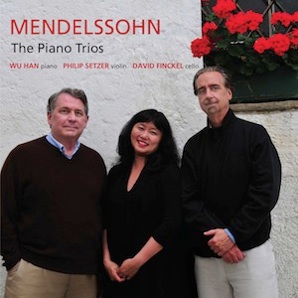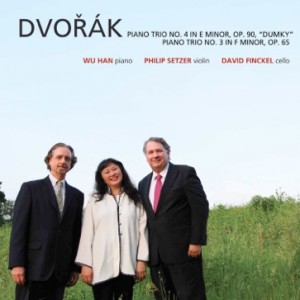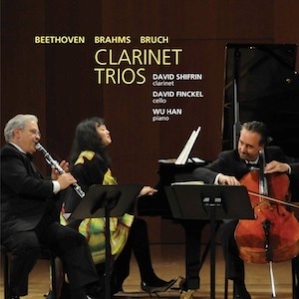Violinist Philip Setzer of the Emerson Quartet, cellist David Finckel, former member of the Emerson, and pianist Wu Han, Finckel’s wife, are musical colleagues who’ve collaborated together in various configurations for decades. But it’s only in the last few years that they’ve appeared together as a trio. As a piano trio they are the new standard against which all other groups must be compared
The three have recorded a few CDs for Finckel and Wu Han’s ArtistLed label. Two of the albums are reviewed below, along with a review of a disc featuring clarinetist David Shifrin.
(Setzer, Finckel and Wu Han are appearing with the Utah Symphony this weekend in Beethoven’s Triple Concerto, a work which they’re performing publicly for the first time at these concerts.)
* * *
 WU HAN, PIANO, PHILIP SETZER, VIOLIN, DAVID FINCKEL, CELLO; Mendelssohn Piano Trios (ArtistLed) ****
WU HAN, PIANO, PHILIP SETZER, VIOLIN, DAVID FINCKEL, CELLO; Mendelssohn Piano Trios (ArtistLed) ****
Felix Mendelssohn’s two piano trios (No. 1 in D minor, op. 49, and No. 2 in C minor, op. 66) are staples of the repertoire. There have been many exceptional recordings made of these two works in the past 50 years, but it would be difficult to name a recording better than this one.
Mendelssohn’s distinctive style blends the clear lines of classicism with romantic expansiveness. Franz Schubert does much the same in his music, but his romanticism is expressed in strikingly different terms. With Mendelssohn, one finds the passionate storminess of romantic expressions, but it’s always tempered with clearly defined parameters; there is nothing excessive in his music.
Philip Setzer, David Finckel and Wu Han understand this. They bring out Mendelssohn’s idiosyncratic style in their polished and refined interpretations. They emphasize the rich expressiveness and delineate the dramatic elements of the music without overdoing it. Nothing is over the top; everything is put into perspective. The trio’s playing is sophisticated and perceptive and makes these works sound as if they were written for them.
 WU HAN, PIANO, PHILIP SETZER, VIOLIN, DAVID FINCKEL, CELLO; Dvořák Piano Trios (ArtistLed) ****
WU HAN, PIANO, PHILIP SETZER, VIOLIN, DAVID FINCKEL, CELLO; Dvořák Piano Trios (ArtistLed) ****
This disc contains two of Antonin Dvořák’s best known and most often played piano trios: No. 3 in F minor, op. 65, and No. 4 in E minor, op. 90, Dumky. As with the Mendelssohn trios, these two by Dvořák are part of the standard repertoire and are also among the great chamber works of the late 19th century.
Dvořák’s music exhibits a robustness tempered with finely crafted lyricism. The Czech composer was indebted to Johannes Brahms for his romanticism, which frequently gives expression in bold, impassioned themes and lush harmonies. But Dvořák doesn’t just imitate; he also brings his own distinctive voice to the mix. He adds a layer of Slavic folk idioms, and this blend of Germanic and Slavic elements is what makes his music stand out.
The three musicians give a vibrant account of each work. They infuse their playing with lyricism and bring a broad palette of expressions to their interpretations. And the slow movements in these two trios benefit from the ensemble’s gorgeously crafted expressiveness and eloquent phrasings.
Setzer, Finckel and Wu Han capture the heart and soul of these emotional laden works. Their readings are thoughtful and well articulated and they bring depth, feeling and passion to their playing.
 DAVID SHIFRIN, CLARINET, DAVID FINCKEL, CELLO, WU HAN, PIANO; Clarinet Trios (ArtistLed) ****
DAVID SHIFRIN, CLARINET, DAVID FINCKEL, CELLO, WU HAN, PIANO; Clarinet Trios (ArtistLed) ****
This is a wonderful album that explores three works for clarinet, cello and piano – a pleasing combination of instruments with distinctive voices that nevertheless blend well together.
On the CD are works by Ludwig van Beethoven, Johannes Brahms and Max Bruch.
The lightest work on the disc is Beethoven’s early Trio in B flat major, op. 11. The work is classically structured and balanced and the three players give an articulate and crisp account that underscores the lightheartedness of the music.
Late in his life, Brahms wrote several chamber works that included the clarinet, among them the Quintet in B minor, op. 115; the two Sonatas, op. 120; and the Trio in A minor, op. 114, which is the work that is on this disc.
As is the case with most of his late works, this trio is dark, somber and inward looking. Gone are the impassioned outbursts of his earlier works. In their place one finds quiet reflection that expresses itself in some of the most eloquent and poetic music Brahms ever penned.
Shifrin and his partners play this trio with beautifully rounded and rich tones that bring out the earnestness of the music. It’s a seamless and organic performance that misses nothing in subtlety, nuances and lyricism.
Rounding out the disc are four movements from Bruch’s Eight Pieces, op. 83. The music requires a clarinetist of extraordinary expressiveness and Shifrin delivers a wonderfully sensitive account of Nos. 2, 3, 6 and 7 in this set. And his playing is mirrored by that of Finckel and Wu Han’s. Together they play with exquisitely molded phrases and seamless lines that capture the character of each piece.
